The long wait to end this September
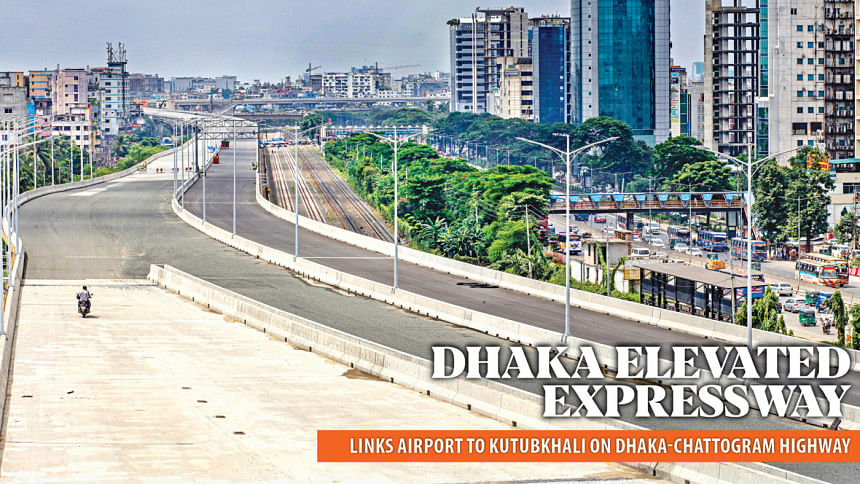
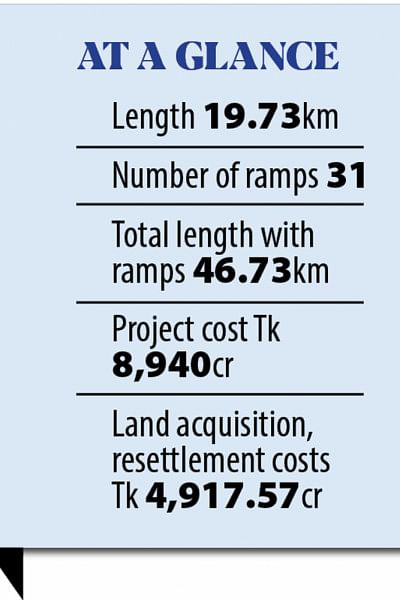
A major part of the Dhaka Elevated Expressway will finally open to traffic in September, more than a decade after the project was initiated to ease the capital's perennial traffic congestion.
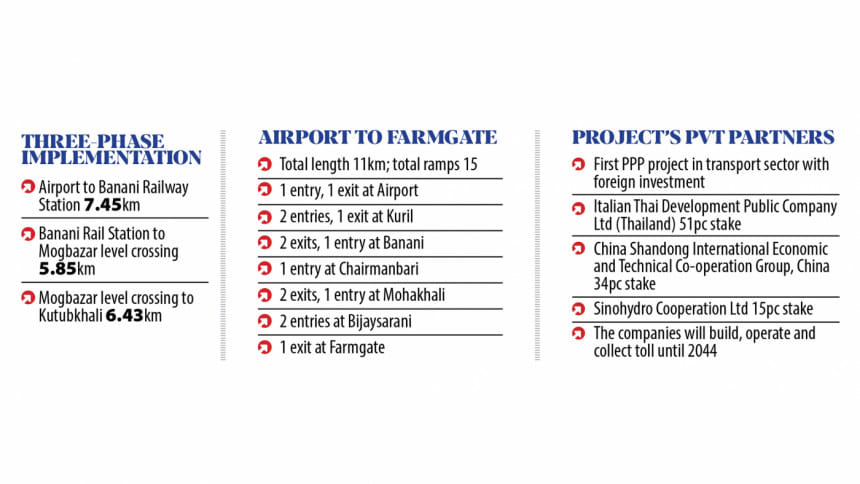
Once the 11-kilometre section from the Hazrat Shahjalal International Airport to Farmgate -- via Kuril, Banani, Mohakhali and Tejgaon -- opens to traffic, it will serve as an alternative route to and from the airport road, one of the busiest in the city.
This section has 15 ramps for accessing and exiting the expressway that will help vehicles avoid traffic-choked crossings and roads, and thus bypass traffic congestion.
Besides, the expressway will be off-limits to three-wheelers and motorcycles, allowing other vehicles to run at 80km per hour, according to sources.
The rest of the 19.73km expressway, the first of its kind in the country, is expected to open next year. Commuters will have to pay tolls to use the expressway, which is also the first project in the transport sector being implemented under the Public-Private Partnership model with foreign investment.
Commenting on the impact it will have on Dhaka's traffic, transport expert Prof Shamsul Hoque said, "The project may not bring about the expected result of easing traffic congestion due to the long delay in its implementation and changes in design in some areas."
He, however, said once the two expressways -- Dhaka Elevated Expressway and Dhaka-Ashulia Expressway -- are completed, it will bring economic benefit to the country.
Dhaka-Ashulia Elevated Expressway -- stretching from Hazrat Shahjalal International Airport to Dhaka Export Processing Zone (DEPZ) on the Nabinagar-Chandra highway via Abdullahpur, Ashulia and Baipail -- is also under construction. The deadline for the project is June 2026.
The two expressways -- around 40km long altogether -- will be connected at the South Kawla point in the airport area.
Once both elevated expressways are operational, people from the country's northern, western and south-western regions will be able to go from one side of the city to another without having to enter the city streets.
This correspondent yesterday took a bike ride on a stretch of the expressway from the airport to the Tejgaon area. It was seen that road surfacing was completed on major portions of the expressway.
More than 80 percent of the work on the toll plaza at the entrance of the expressway at the South Kawla point was completed. The toll plaza will have a total of six booths, two of which will have electric toll collection system, officials posted there told this correspondent.
Lampposts were also installed on the median of the expressway on major portions. Hundreds of workers were seen working mainly on the ramps.
One of the major exit ramps is built over the airport road at South Kawla. It ends near the airport's third terminal, which is under construction. If one entered the expressway from the Mohakhali or Banani area, they will easily be able to head towards the airport or Gazipur using this ramp.
One can easily enter the expressway using the entry ramp close to the third terminal.
In addition to these two, 13 more ramps are being built -- two entry ramps and one exit ramp at Kuril; two exit ramps and one entry ramp at Banani; one entry ramp at Chairmanbari; two exit ramps and one entry ramp at Mohakhali; two entry ramps at Bijaysarani; and one exit ramp at Farmgate.
All the 15 ramps will be completed by September but they will be opened to traffic in phases as all of them will not be required until the entire expressway is opened to public, Project Director AHMS Akhtar told The Daily Star yesterday.
He said 90 percent of the construction work from the airport to Farmgate is completed.
After visiting the site, Road Transport and Bridges Minister Obaidul Quader told reporters that Prime Minister Sheikh Hasina will inaugurate the airport to Farmgate section in September this year.
The minister said the overall progress of the project is 63.20 percent till June.
Replying to a question, he also said three-wheelers and motorcycles will not be allowed to operate on the expressway.
LONG DELAY, DESIGN CHANGES
Prof Shamsul said the government in 2010 had conceived the plan to build the elevated expressway to create an alternative route as the construction work of the metro rail and bus rapid transit (BRT) would interrupt flow of traffic on major roads in the city and adjacent areas.
The expressway was supposed to be completed by 2013 but it was delayed. In the meantime, the authority was forced to drop the BRT expansion plan from the airport to Mohakhali, he said.
Besides, a U-loop was planned in the Chairmanbari area but it was dropped later, raising concern for increased traffic congestion in the Kakali area, he said.
Bijoysarani is notorious for traffic congestion and now more vehicles will use the flyover there as two entry ramps have been built connecting the flyover that links Bijoysarani and Tejgaon.
There was a plan to address this issue but it was also dropped. The Bijoysarani area, therefore, may witness more traffic congestion, he said.
"So, in the current context, instead of easing traffic congestion, the expressway may increase tailbacks in some areas," he told The Daily Star yesterday.
Prof Shamsul, however, stressed that once the two expressways are operational, they will bring economic benefits to the country.
He said trucks and lorries, which are now barred from entering the city during the day to curb traffic jams, will use the expressways as "vertical bypass", thus helping businesses in Dhaka EPZ, and Gazipur and Savar areas.
The construction work of the expressway was inaugurated twice, first by Prime Minister Sheikh Hasina in April 2011 and once again by Obaidul Quader in August 2015.
However, the formal construction commencement date is January 1, 2020, the date which marks the beginning of 25 years concession era, including three and a half years construction period.
In January 2011, Bangladesh Bridge Authority (BBA) signed a deal with Italian-Thai Development Public Company to build the expressway at a cost of Tk 8,703 crore.
The deal was revised and inked again in December 2013, with the cost revised at Tk 8,940 crore after bringing several changes to the design. The government will give Tk 2,413 crore (27 percent) as viability gap funding while the private partner will bear the rest.
Besides, the government is to spend Tk 4917.57 crore on land acquisition, resettlement and relocation of utility service lines, meaning the total cost of the project is Tk 13,857.57 crore.
But the scheme faltered time and again over the years, mainly due to the failure of the private investor -- Italian-Thai-- to manage funds for the project and problems related to land acquisition, said officials involved in the project.
However, the fund-related crisis was resolved after Italian-Thai handed over 49 percent of its share to two Chinese companies -- China Shandong International Economic and Technical Corporation Group (34 percent) and Sino Hydro Corporation Ltd (15 percent) 2020.

 For all latest news, follow The Daily Star's Google News channel.
For all latest news, follow The Daily Star's Google News channel. 

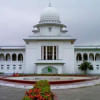

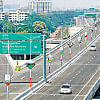
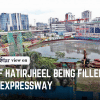


Comments